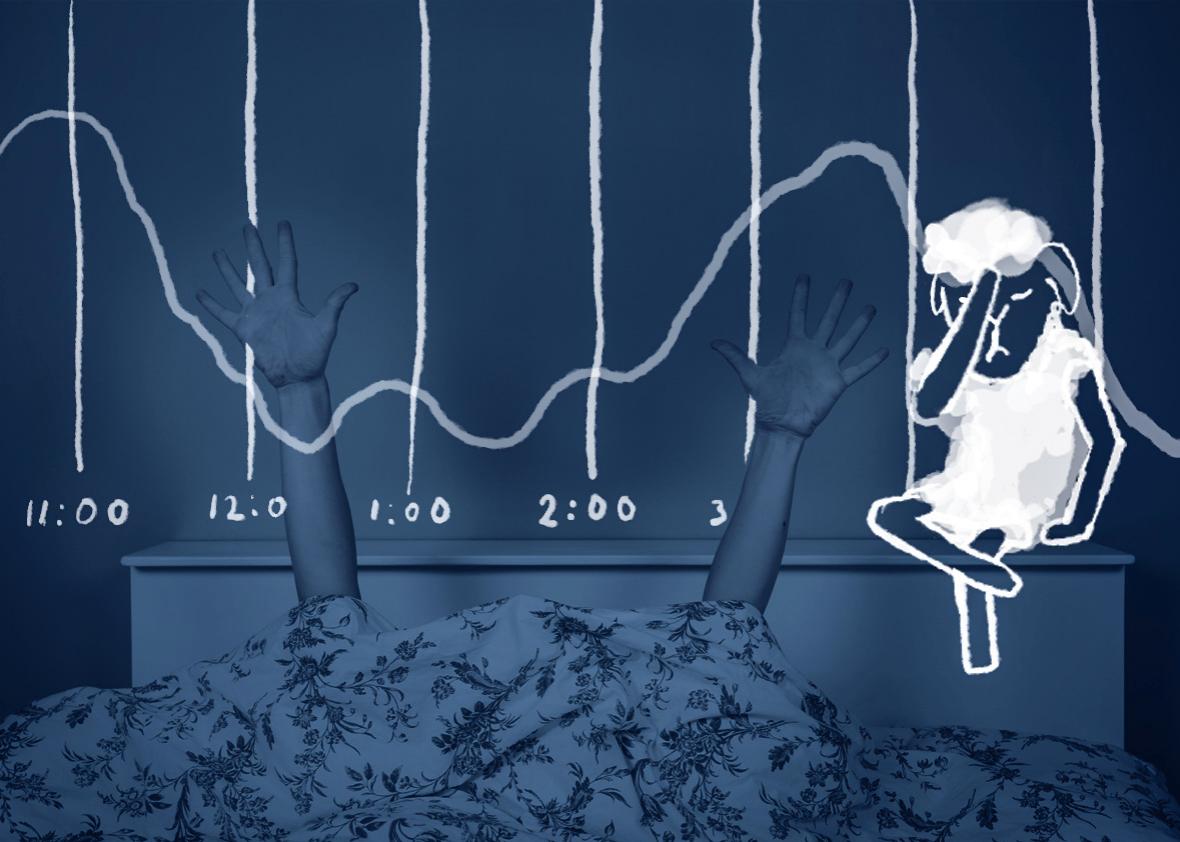I am writing this article because I am deeply in debt, and I don’t know what to do. I’m not out of work. And it’s not that I’m broke. The source of my profound destitution: I’m not sleeping enough.
I never thought in terms of “sleep debts” until I found SleepBot, one of two apps—the other is called Sleep Cycle—that I used to record my sleep for most of November. Each night for a month, I set my phone face down on my mattress, not far from where I lay my head. Each morning I was awoken by one of the app’s klaxons—a sound supposedly keyed to my biorhythms, but as irritating as any other alarm. And each day my “current debt” accumulated, unslept hours stacking atop one another, pulling me down with them.
SleepBot sets a goal for me each night: eight hours of steady slumber. That figure is flexible (set it as low as three if you dare), but eight hours is the default. Whatever its possible benefits, this app and others like it have less to do with the science of sleep than with the appearance of scientific precision. SleepBot’s economic language is telling, too: However poorly we sleep, to speak of it in terms of debt is to hold out the possibility that things might be otherwise—that we might hoard sleep, grow rich with shut eye.
But what we quantify when we quantify sleep is something almost entirely beyond our control. Sleep-tracker apps employ our smartphone’s accelerometers to track our involuntary movements while we snooze; Sleep Cycle weaves this data into a visual story about each night’s rest, a pictorial narrative of peaks and valleys. When the user is relatively immobile—in deep sleep—the line sinks, but the more you toss and turn, the higher it climbs. Even the best charts spike and fall, but, in theory, a good night would be one spent mostly in the low country.
However elegantly this information is presented, it’s hard to say what one is supposed to take from it. As I’ve written before, research suggests that people benefit from quantified-self technologies—pedometers, heart rate trackers, and so on—when they’re willing to really explore the data they’re generating. In the month that I spent studying my sleep, I learned only one thing: that I tend to wake up at 4 a.m. for half an hour, regardless of when I go to bed. Everything else seems indistinguishable from the anecdotal or the obvious. I don’t need a smartphone to tell me I shouldn’t drink so much caffeine in the late afternoon.
If anything, tracking my sleep may have disrupted the very experience it aspired to monitor and assist. Thanks to the way these apps function, I had to keep my phone near my head. My first instinct when I wake up in the middle of the night with the phone nearby is to fumble for it—checking my email, scrolling through Twitter, and otherwise catching up with the activity of a world that could have safely waited. Sometimes I would flip back over to my tracking apps, hopeful that their meaningless data streams would bore me back to sleep. Even in this, they failed me.
There are, of course, alternatives to monitoring by phone. My friend Ben swears by his Fitbit, which resides more inconspicuously on his wrist. He takes great pride in the information it feeds him, letting me know whenever he breaks his personal record for consecutive hours of deep sleep. In his attempt to keep shattering it, he’s started to pay more attention to things such as when he turns the lights out or whether or not to have that last cocktail. I suppose this is the best-case scenario for sleep tracking: that it inspires us to make better decisions.
Still, the actions we take in response to sleep trackers don’t necessarily correlate to the data they produce. When you’re wearing a pedometer, steps taken correspond to steps recorded. But if you cut out caffeine before bed, that’s no guarantee that your device will record “better” sleep—or that you’ll actually sleep better. If you don’t sleep better, carefully monitoring your results will only foreground your failure. Sleep trackers can make spectacles of our helplessness.
That, at any rate, is what sleep tracking has shown me. It’s taught me that I don’t control my own sleep and probably never will. To strain that economic metaphor: I’ve never been great at keeping track of my finances, and I live in dread of my lack of fiscal self-control. When I confront my supposed sleep debt, however, I’m forced to accept that I control almost nothing at all—not myself, not my bedtime, and certainly not anything that happens after I doze off.
Read more from The Drift, Slate’s pop-up blog about sleep.
